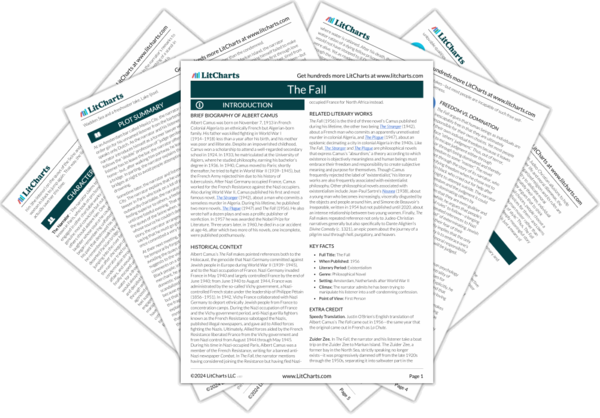In The Fall, egotism is central to human psychology and action. The novel conveys the centrality of egotism through its narrator, who argues for egotism’s importance both explicitly and implicitly. Explicitly, he claims that individuals “can’t love without self-love” and that “the joy of self-esteem” is what motivates individuals to loving or virtuous behavior—while threats of self-esteem can motivate them even to murder. The narrator repeatedly makes himself an example of this kind of self-centeredness, claiming that in all his love affairs with women, his “one great love” was himself, a self-love that motivated him to seek adoration and loyalty from women only to become bored with them once they had flattered his vanity. Implicitly, the narrator also argues for egotism’s importance through his behavior: he eventually reveals to his unnamed listener that throughout their conversations, he has been attempting to elicit a self-condemning confession from the listener so that he himself can feel superior despite his acute awareness of his own flaws and failures. Thus, the novel suggests that egotism is a trap in which all human beings are stuck: on the one hand, we all want to love and esteem ourselves. On the other hand, however, we are better positioned than anyone to know our own ugly and unlovable qualities.
Egotism ThemeTracker

Egotism Quotes in The Fall
Anyone who has considerably meditated on man, by profession or vocation, is led to feel nostalgia for the primates. They at least don’t have any ulterior motives.

Unlock explanations and citation info for this and every other The Fall quote.
Plus so much more...
Get LitCharts A+The feeling of the law, the satisfaction of being right, the joy of self-esteem, cher monsieur, are powerful incentives for keeping us upright or keeping us moving forward.
A very Christian friend of mine admitted that one’s initial feeling on seeing a beggar approach one’s house is unpleasant. Well, with me it was worse: I used to exult.
Even in the details of daily life, I needed to feel above. I preferred the bus to the subway, open carriages to taxis, terraces to closed-in places.
That’s the way man is, cher monsieur. He has two faces: he can’t love without self-love.
Oh, I don’t know. Really, I don’t know. The next day, and the days following, I didn’t read the papers.
To be sure, I knew my failings and regretted them. Yet I continued to forget them with a rather meritorious obstinacy. The prosecution of others, on the contrary, went on constantly in my heart. Of course—does that shock you? Maybe you think it’s not logical? But the question is not to remain logical. The question is to slip through and, above all—yes, above all, the question is to elude judgment.
As I told you, it’s a matter of dodging judgment. Since it is hard to dodge it, tricky to get one’s nature simultaneously admired and excused, they all strive to be rich. Why? Did you ever ask yourself? For power, of course. But especially because wealth shields from immediate judgment, takes you out of the subway crowd to enclose you in a chromium-plated automobile, isolates you in huge protected lawns, Pullmans, first-class cabins.
Then I realized, as a result of delving in my memory, that modesty helped me to sin, humility to conquer, and virtue to oppress.
I had to submit and admit my guilt. I had to live in the little-ease. To be sure, you are not familiar with that dungeon-cell that was called the little-ease in the Middle Ages. In general, one was forgotten there for life. That cell was distinguished from others by ingenious dimensions. It was not high enough to stand up in nor yet wide enough to lie down in.











